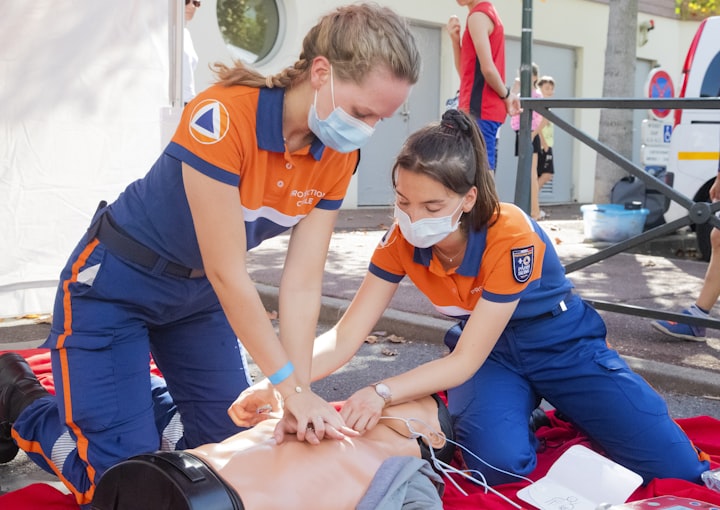Recognising a Heart Attack: What to Do Next
The Home Doctor - A practical guide for every-household
Introduction
Heart attacks are among the most serious and potentially fatal medical emergencies. Knowing how to recognize a heart attack and what to do next can be life-saving. In this blog post, we'll explore the signs and symptoms of a heart attack, as well as the steps you should take if you or someone else is having one. We'll also discuss ways to reduce your risk of a heart attack, so that you can be prepared if one occurs. By the end, you'll know what to do in the event of a heart attack and how to help someone in need.
Heart attacks are often misunderstood
Heart attacks can happen suddenly, or over the course of several days. Unfortunately, many people don't understand the warning signs and symptoms of a heart attack and as a result, they don't seek medical help until it is too late. Many people are surprised to learn that heart attacks can occur in young adults and even children, so it’s important to know the signs and take action quickly if you experience them.
>>>>click here if you want learn more how to tackle different emergency problems <<<<<<<<<<
Heart attacks are caused when the blood supply to a section of the heart muscle is blocked, usually due to a buildup of cholesterol and fatty deposits in the coronary arteries. The blockage prevents oxygen and other vital nutrients from reaching the heart muscle, which causes it to die. The result is chest pain, difficulty breathing, and even a heart attack.
It’s important to know the difference between normal chest pains associated with physical activity and more serious heart attack symptoms. If you experience any of the following, seek immediate medical attention:
• Chest pain or discomfort that lasts more than a few minutes
• Pain that spreads to your shoulders, neck, arms, or jaw
• Shortness of breath
• Cold sweats
The sooner you receive medical attention, the greater your chances of surviving a heart attack. Don’t wait for all of the symptoms to appear – if you experience any of them, call 911 or get to an emergency room right away.
Symptoms of a heart attack
The symptoms of a heart attack can vary from person to person, but there are some common signs to look out for. Chest pain is the most common symptom, but it may also be felt in the arms, back, neck, jaw or stomach. This pain may come and go, or it may last for longer periods of time.
>>>>click here if you want learn more how to tackle different emergency problems <<<<<<<<<<
Other symptoms of a heart attack may include shortness of breath, nausea, sweating, feeling lightheaded or dizzy, and extreme fatigue. If you experience any of these symptoms, it’s important to seek medical help immediately. It’s also important to note that women are more likely to experience some atypical symptoms such as neck or shoulder pain, indigestion, or extreme fatigue without chest pain.
If you think you may be having a heart attack, call 911 and get to the nearest emergency room. Time is of the essence in treating a heart attack. Don’t delay treatment – seek medical help immediately.
What to do if you think you're having a heart attack
If you think you may be having a heart attack, it’s important to seek medical attention as quickly as possible. Every minute counts when it comes to receiving treatment for a heart attack. Here are some steps to take if you think you’re having a heart attack:
1. Call 911 or your local emergency services number immediately. Don’t wait for symptoms to go away.
2. Take an aspirin. If you don’t have a history of allergies or stomach problems, chew and swallow one full-strength aspirin tablet (81 milligrams). Aspirin helps prevent blood clotting, which can help lessen the severity of a heart attack.
3. Sit down and rest. Avoid physical exertion and try to remain calm. Stress and physical activity can increase your risk of having a heart attack.
4. Keep yourself warm. A cold environment can constrict your arteries, making it harder for blood to flow through them.
5. Wait for help to arrive. Don’t attempt to drive yourself to the hospital. Instead, wait for paramedics or someone who can drive you safely.
Remember: Every second counts when it comes to receiving treatment for a heart attack. If you think you may be having a heart attack, don’t hesitate to call 911 and seek medical attention right away.
When to see a doctor
When it comes to heart attacks, timing is of the utmost importance. Knowing when to seek medical help can mean the difference between life and death. It’s important to recognise the signs and symptoms of a heart attack and get help as soon as possible.
If you experience any symptoms of a heart attack, seek medical attention immediately. Even if you are not sure it is a heart attack, it is better to be safe than sorry. If you think you or someone else may be having a heart attack, call 911 or your local emergency number right away.
In some cases, you may experience milder symptoms that may not be indicative of a heart attack. In these cases, it is still best to speak with your doctor as soon as possible to determine the cause and get treatment if necessary. Symptoms such as chest pain, shortness of breath, or a feeling of fullness in the chest should be taken seriously.
If you are at risk for heart disease due to pre-existing conditions or lifestyle factors, it is important to talk to your doctor about when to come in for a check-up. Your doctor can help you determine if any changes need to be made in order to reduce your risk of heart attack or other serious complications.
>>>>click here if you want learn more how to tackle different emergency problems <<<<<<<<<<
It is also important to note that some people may not experience any symptoms prior to a heart attack. This is why regular check-ups are important for those at risk for heart disease, as well as for everyone. Your doctor can help determine if further testing is needed and provide guidance on preventive measures to reduce your risk.
If you experience any signs or symptoms of a heart attack, don’t wait - get help immediately. It is always better to err on the side of caution and seek medical care as soon as possible.
>>>>click here if you want learn more how to tackle different emergency problems <<<<<<<<<<







Comments
There are no comments for this story
Be the first to respond and start the conversation.